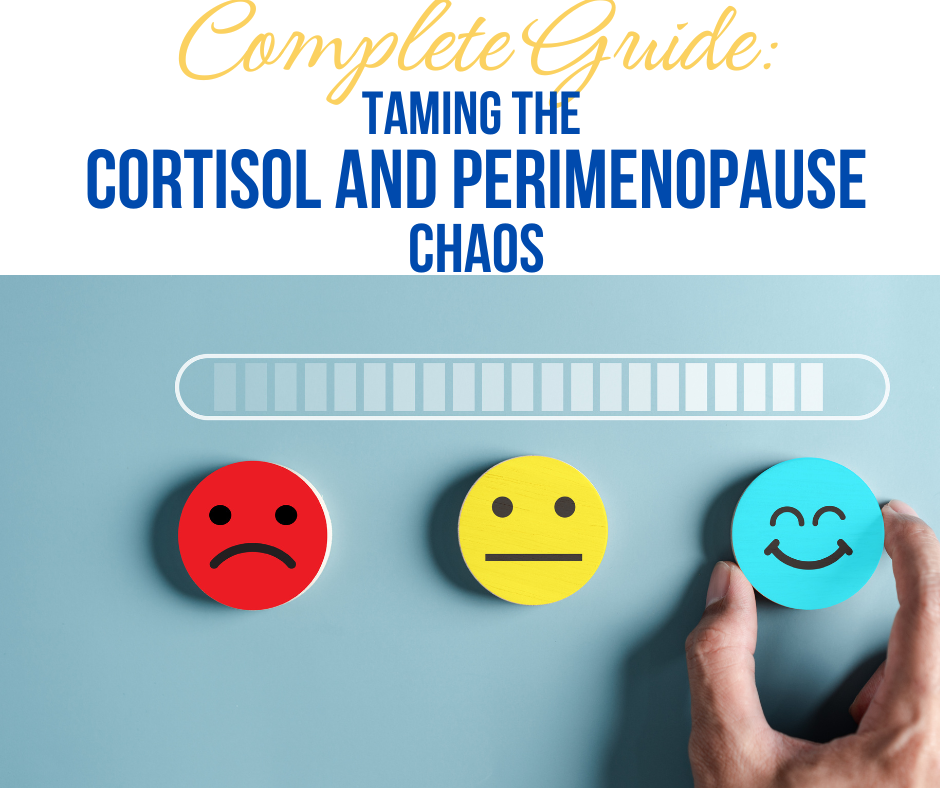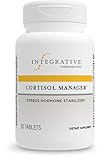Are you struggling with stubborn belly fat that seems to have appeared out of nowhere since hitting your 40s or 50s? You’re not alone—this is very common. Cortisol and perimenopause have a definitive link. Let’s explore that today!

Taming the Cortisol and Perimenopause Chaos: Lifestyle Hacks to Bust Belly Fat
As a functional medicine doctor who’s been through menopause myself, I understand the frustration that comes with these unexpected body changes. Today, let’s dive into the connection between cortisol, perimenopause, and that annoying and frustrating midsection weight gain.
The Cortisol-Belly Fat Connection
Cortisol, our body’s primary stress hormone, plays a significant role in how we store fat, especially during perimenopause and menopause. When our hormones start to shift, it can lead to an increase in cortisol production. This hormonal imbalance, combined with other factors like sleep disturbances and decreased energy levels, can create the perfect storm for stubborn belly fat. Estrogen dominance, a common imbalance found in the first few years of perimenopause, can also contribute to increased belly fat- and all of the above.
*This post contains affiliate links for which I could earn a commission at no additional cost to you.
The Mitochondrial Link
Now, you might be wondering, “What do my cell’s powerhouses have to do with my waistline?” Well, quite a lot, actually. Our mitochondria are responsible for producing energy and regulating metabolism. They produce energy from your food, and their efficiency affects your weight, energy levels, and even your sleep. They also interact closely with cortisol levels.
When cortisol levels spike, it signals our mitochondria to switch into “carb burn” mode for a quick energy boost. This is great for short-term stress situations but becomes problematic when cortisol remains chronically elevated. Chronically elevated cortisol makes your mitochondria over-dependent on carbs for fuel. Over time, they forget how to burn fat.
Constant carb burning can lead to:
- Decreased metabolism
- Increased belly fat storage
- Disrupted sleep patterns
- Accelerated cellular aging
Lifestyle Changes to Balance Cortisol
While supplements can be helpful (and we’ll get to those), the most crucial aspect of managing cortisol levels is through lifestyle modifications. Here are some key areas to focus on:
1. Mindful Caffeine and Alcohol Consumption
Both caffeine and alcohol can disrupt your cortisol balance- putting extra strain on your stress hormones and female hormones.
Try to:
- Limit coffee intake to one cup per day or switch to green tea- here’s my favorite brand of green tea (they test it for heavy metals and pesticides, and it’s organic).
- Reduce alcohol consumption to 2-3 drinks per week, or consider eliminating it entirely.
2. Nourish Your Body
Focus on foods that support hormone balance and boost serotonin levels:
- Increase omega-3-rich foods like wild-caught salmon, flax, chia, and walnuts
- Reduce added sugars to less than 20 grams per day- the less the better, of course
- Aim for 3-5 servings of vegetables and 2 servings of fruit daily
- Increase fiber intake to support gut health and hormone balance. I have my patients (and myself) to aim for 35 grams per day.
3. Move Your Body (Gently)
Exercise is crucial, but be mindful not to overdo it. Opt for activities that energize rather than deplete you:
- Walking
- Swimming
- Yoga or Pilates
- Gentle weight lifting
Aim for at least 5,000 steps daily, gradually working up to 10,000 if possible.
If you track your heart rate zones, aim to stay in zone 2. If you go to higher heart rates make sure you do this cyclically and have a few minutes of recovery in between.
For strength training goals, aim for 30 minutes 2-3 times per week. This could be using the circuit machines at the gym, doing resistance band exercises, TRX, or dumbbell workouts at home, or simple bodyweight exercises like push-ups and planks.
Yoga and/or Pilates can also help build strength and flexibility and offer support for lowering cortisol through deep and rhythmic breathing.
4. Prioritize Stress Reduction
Reducing stress can have a big impact on your health. Stress reduction helps restore cortisol to a healthy level, allowing your mitochondria to switch between burning carbs and fats efficiently.
Incorporate stress-reducing practices into your daily routine:
- Deep breathing exercises
- Meditation (I love the Aura app for guided sessions)
- Journaling
- Gratitude practice

Tracking Your Metabolism
Understanding whether you’re in “carb burn” or “fat burn” mode can be incredibly helpful in managing cortisol levels and stubborn belly fat. This is where tools like the Lumen device (you can use code DRMEYER to save) can be beneficial.
By providing insights into your metabolism, the Lumen can help you make more informed decisions about your diet and exercise routine. This science-backed device gets to know your unique body, providing you with personalized lifestyle guidance and nutrition plans based on your metabolic measurements so you can reach your weight goals and manage your menopause symptoms.
Supplement Support
While lifestyle changes should be your primary focus, certain supplements can provide additional support in balancing cortisol levels. There’s not one specific herb, nutrient, or blend that works for everyone, as we are all unique, but these are some of the key nutrients that I find the most effective:
- L-theanine: Promotes relaxation without drowsiness. Interestingly, it can also promote focus!
- Phosphatidylserine: May help reduce cortisol levels. This nutrient can be taken on its own but also can be found in many cortisol lowering blends.
- Adaptogenic herbs: Such as maca and ashwagandha, can help the body adapt to stress. They can sometimes be too stimulating so always keep an eye on your sleep and anxiety levels if you start either of these. Adaptogenic herbs usually adapt to what your unique ecosystem needs but it’s always a good idea to closely monitor your response to these and any other supplements.
Some blends I often recommend to patients include:
- Cortisol Manager by Integrative Therapeutics: Calming blend of phosphatidyl serine, ashwagandha, l-theanine, and magnolia.
Integrative Therapeutics - Cortisol Manager - Supplement with Ashwagandha and L-Theanine - Supports Relaxation & Calm* - 30 Tablets
- Cortisol Manager: With ongoing use, these certified vegan tablets support balanced cortisol levels and a healthy response to stress*
- Ashwagandha & L-Theanine Supplement: This stress support supplement contains a blend of Sensoril brand ashwagandha (Withania somnifera) and L-theanine*;Sensoril is a registered trademark of Natreon, Inc.
- Supports Restful Sleep: This supplement helps support relaxation and calm to support restful sleep*
- Stress Support: Your adrenal glands play a large role in supporting stress levels; this adrenal support supplement supports stress while supporting adrenal health*
- For over 35 years, patients and clinicians have trusted Integrative Therapeutics for our dedication to quality, potency, and accuracy; transparency around our sourcing and manufacturing processes is part of our quality promise to you
- Cortisol Calm by Pure Encapsulations: A nice blend of vitamin D, Ashwagandha, Rhodiola, L-theanine, and Magnolia.
Pure Encapsulations Cortisol Calm - Supports Cortisol Health & Relaxation - Contains Ashwagandha & L-Theanine - Restful Sleep - 60 Capsules
- Cortisol Support: Cortisol Calm is formulated to maintain healthy cortisol response, aiding in stress management*
- Sleep & Relaxation: Encourages restful sleep and a positive outlook, offering support during times of occasional stress*
- Herbal Cortisol Health: Contains a blend of herbal extracts, ashwagandha, and vitamin D*
- Suggested Use: As a dietary supplement, take 1 capsule of Cortisol Calm in the morning and 1 capsule in the evening, with meals
- Pure Difference: What we leave out matters, too; Pure Encapsulations products are FREE FROM common allergens, artificial or unnecessary ingredients, and GMOs
- HPA Adapt (particularly helpful for balancing cortisol throughout the day), is a cortisol-balancing blend, but it can be too stimulating for some people with high cortisol levels and anxiety.
Integrative Therapeutics HPA Adapt - Supports a Healthy Stress Response* - Positive Outlook Supplement with Ashwagandha, Maca, Holy Basil & Rhodiola - Gluten-Free & Soy-Free - 120 Vegan Capsules
- Stress Supplement for Men & Women*: Helps support the body in times of stress*; supports the HPA axis to maintain stress hormonal balance and a healthy stress response*
- Supplement for Stress Support*: HPA Adapt encourages feelings of calm, reduces stress-related tiredness, supports cognitive function, and supports a positive outlook*
- Supplement with Maca & Ashwagandha: With a unique adaptogenic herbal blend including rhodiola root extract, Sensoril ashwagandha root and leaf extract, eleuthero root extract, maca root extract, and holy basil leaf extract*
- HPA Axis & Hormone Support Supplement*: This healthy stress support supplement is gluten-free, soy-free, and vegan; doesn't contain salt, wheat, dairy, or artificial colors or flavors*
- For over 35 years, patients and clinicians have trusted Integrative Therapeutics for our dedication to quality, potency, and accuracy; transparency around our sourcing and manufacturing processes is part of our quality promise to you
Remember, always consult with your healthcare provider before starting any new supplement regimen, as individual needs can vary greatly.
The Bottom Line
Tackling stubborn belly fat during perimenopause and menopause requires a multi-faceted approach. By focusing on lifestyle changes that support balanced cortisol levels, you’re not just addressing weight concerns – you’re promoting overall health and well-being.
Remember, this is a journey. Be patient with yourself and celebrate the small victories along the way. Your body is going through significant changes, and it deserves your kindness and understanding.
Have you tried any of these strategies to manage cortisol levels and stubborn belly fat? I’d love to hear about your experiences in the comments below!
You may also like:
What No One Tells You About Cortisol and Estrogen Dominance
Estrogen Dominance and Gut Health: How to Heal Both Naturally
A Complete Guide: How Does Perimenopause Affect You?

Dr. Shelley Meyer is a board-certified family physician and Institute of Functional Medicine-certified functional medicine physician, as well as a Registered Dietitian. She is passionate about helping women navigate the roller coaster of perimenopause and postmenopause. She has her own Functional Medicine Practice in Denver, Colorado.







Leave a Reply
You must be logged in to post a comment.